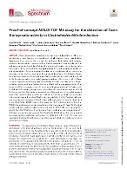Proof-of-concept MALDI-TOF-MS assay for the detection of Toxin B enzymatic activity in Clostridioides difficile infection

Author
Vlková, Kateřina
Študentová, Vendula
Geigerová, Lenka
Volny, Michael
Novak, Petr
Publication date
2025Published in
Microbiology SpectrumISBN / ISSN
ISSN: 2165-0497ISBN / ISSN
eISSN: 2165-0497Metadata
Show full item recordCollections
This publication has a published version with DOI 10.1128/spectrum.02453-24
Abstract
Matrix-assisted laser desorption/ionization time-of-flight (MALDI-TOF) mass spectrometers have become an integral part of all modern clinical microbiology laboratories. They serve as the key tool for pathogen identification and antibiotic resistance determination. However, certain limiting conditions must be fulfilled. The pathogen cannot be tested directly from the sample and requires the cultivation of a pure colony, which means that the standard protocol takes additional time, workforce, and consumables. The testing protocol is also more complicated when it comes to anaerobes. In our work, we focused on the functional detection of Clostridioides difficile, an important nosocomial human pathogen that is responsible for diarrhea and can lead to life-threatening colitis, as a model diagnostic problem. The virulence of C. difficile is mainly caused by two toxins, Toxin A and Toxin B. Established diagnostic methods, including nucleic acid amplification testing methods and immunoassays, detect the presence of the microorganism or the presence and concentration of the toxins, with limited ability to gauge infection severity based on the actual biochemical activity of the toxins and thus their potency to cause harm. This work presents proof-of-concept assays that indirectly determine the toxin activity in the human stool, a very complex matrix sample, using the natural RhoA protein as substrate. The RhoA protein substrate was recombinantly prepared with biotin tag modification, which allows its attachment to the NeutrAvidin MALDI chips. In the assay, the RhoA substrate anchored on the MALDI chip undergoes enzymatic glycosylation when exposed to the Toxin B in the stool sample, and the reaction product is then detected by MALDI-TOF mass spectrometry directly from the MALDI chip. The entire assay, from sampling to final mass spectrometry detection, was performed in situ, on the NeutrAvidin MALDI chip, which was prepared by unique surface modification technology also described in this work. The assay was successfully tested for the detection of Toxin B in a cohort of patient samples as well as in cell culture of C. difficile. IMPORTANCE: The diagnostics of Clostridioides difficile infection is usually based on the identification of the bacterial pathogen and/or on the detection of the Toxins A and B. Due to the variance in Toxins A and B activity across species, the toxin concentration determined by standard methods does not necessarily correlate with the severity of the disease. Assays that would target toxins' enzymatic activity are not routinely used because the requirements are unsuitable for clinical laboratories. In this study, we demonstrate a new approach that determines the presence and potency of Toxin B indirectly by determining its enzymatic activity rather than its concentration. This is performed by detecting mass difference due to glycosylation of RhoA substrate by Toxin B, which is then determined by matrix-assisted laser desorption/ionization time-of-flight mass spectrometry. The presented proof-of-concept assay thus offers the possibility to quickly determine the activity of C. difficile toxins directly in the stool samples without pathogen cultivation.
Keywords
C. difficile, MALDI-TOF-MS, Toxin B, diagnostics
Permanent link
https://hdl.handle.net/20.500.14178/3084License
Full text of this result is licensed under: Creative Commons Uveďte původ 4.0 International






